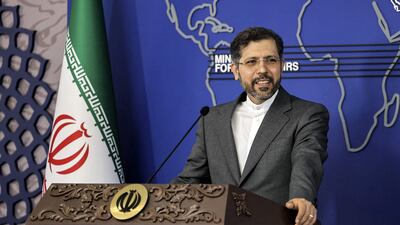Iran could be ready for an exchange of prisoners with the US, its state-linked Fars news outlet reported on Wednesday.
The Fars report cited comments made by Saeed Khatibzadeh, spokesman for the Iranian Foreign Ministry.
"We are ready for the implementation of the agreement so that innocent Iranians imprisoned in the United States can be freed and quickly returned to the arms of their families,” Fars quoted the spokesman as saying.
The statement comes as the European Union and the US study Iran’s written response to what has been called a “final draft” of a new agreement, intended to revive the 2015-2018 nuclear deal. Several outstanding issues remain, one of the senior advisers to Iranian negotiators said on Wednesday.
The agreement struck in 2015 allowed UN nuclear inspectors into Iranian nuclear sites in exchange for the US lifting stringent trade sanctions.
But Iran complained that foreign investment was slow to return after 2015, despite the deal. Analysts said that was due in part to sanctions remaining in place on Tehran’s Islamic Revolutionary Guard Corps.
The IRGC runs a network of companies in Iran and some foreign investors were uncertain of the risk of unintentionally breaching sanctions against the force, which was listed as a terrorist organisation by Donald's Trump administration, a designation which continued under US President Joe Biden.
Critics of the Iranian regime — which has imprisoned scores of dual citizens, often on fabricated charges of espionage — claim the regime has held people as “hostages” to gain leverage in nuclear talks.
Uranium warning
Mohammad Marandi, a senior adviser to the Iranian negotiators involved in 16 months of talks with the EU, Russia, China and, indirectly, the US, on Wednesday spoke of unresolved issues.
He told the BBC that under the Joint Comprehensive Plan of Action — the name for the original deal agreed under Barack Obama and scrapped by Mr Trump — the US had not given strong enough assurances to western companies wishing to invest in Iran once sanctions were lifted.
“They came in when the agreement was acceptable to all sides,” Mr Marandi said.
“The US repeatedly violated the JCPOA under Obama and later tore it up at zero cost. Henceforth, violating the deal must come at a price.”
While he did not elaborate on how the Obama administration had breached the 2015 nuclear deal, he said any unilateral violation by Washington would come with the cost of the rapid resumption of uranium enrichment by Iran.









